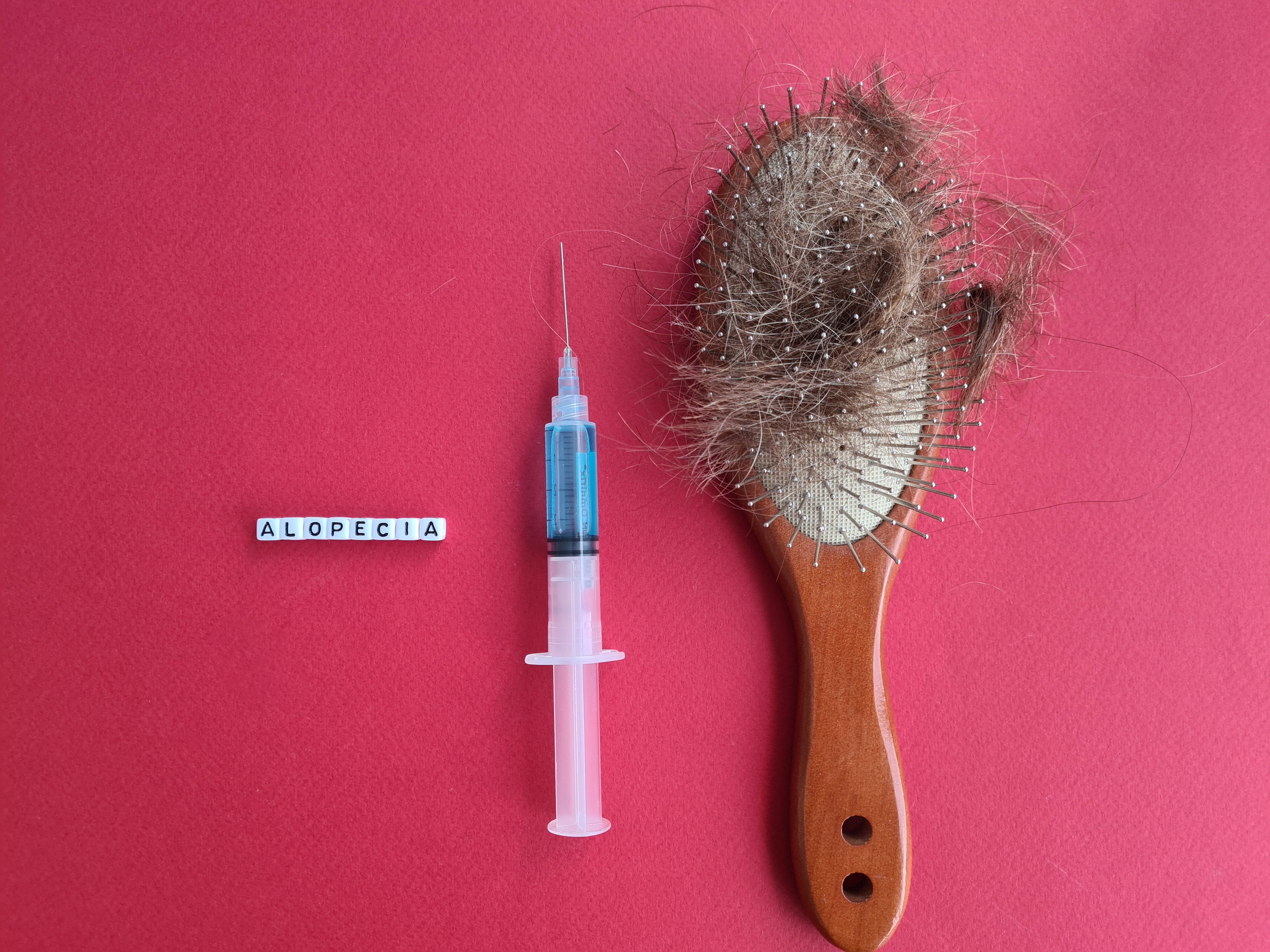- Center on Health Equity & Access
- Clinical
- Health Care Cost
- Health Care Delivery
- Insurance
- Policy
- Technology
- Value-Based Care
Hair Regrowth in Severe Alopecia Areata Improves Quality of Life While Reducing Anxiety, Depression
People with alopecia areata who experience hair regrowth may also see improvements in their quality of life and mental health, according to a new study.
Alopecia hair loss in hair brush, medical syringe | Image Credit: Nadzeya - stock.adobe.com

A post hoc study conducted in adults with alopecia areata (AA), a hair loss disorder, proved hair regrowth is directly related to the health-related quality of life and psychological burden in patients.
The randomized, double-blind, parallel-group, placebo-controlled trial, published in the Journal of Dermatological Treatment, included 169 centers across 10 countries. The study included 2 phase 3 trials (n = 1200 patients) where participants received either a once-daily placebo, 2 mg of baricitinib, or 4 mg of baricitinib. The severity of alopecia tool (SALT) was split into a scoring system of the meaningful regrowth score (< 20), intermediate regrowth (> 30), and no/minimal regrowth (>20, never reached 30% improvement from baseline SALT score).
The effects AA imposes on patient health-related quality of life (HRQoL) was measured throughout the study with Skindex-16. The patients’ HRQoL used symptoms, emotions, and functioning as primary domains, where normal scores ranged from 0 (no effect) to 100 (effect experienced all the time).
Psychological distress in adults with severe forms of AA was assessed with the Hospital Anxiety and Depression Scale (HADS). Anxiety levels were labeled as HADS-A while depression uptick was referred to as HADS-D. Patients observed their HADS levels over the past week, scoring on a 0 to 21 scale, with higher numbers indicating more severe mental illness. Normal scores for mental illness were considered less than 8, recognizing borderline or abnormal (B/AB) scores for anxiety or depression at baseline (HADS-A or HADS-D > 8).
During the 36-week study period, 256 (21.3%) patients experienced meaningful hair regrowth, 268 (22.3%) had intermediate regrowth, and 676 (56.3%) had no/minimal regrowth. More patients administered baricitinib experienced meaningful regrowth (94.5%). Patients in the no/minimal regrowth group primarily included patients receiving placebo (81.1%).
Study results depicted similar B/AB HADS scores at week 36 in comparison with baseline groups. Out of the 3 domains, the highest Skindex-16 AA score when recorded at baseline was emotions. An estimated 33% to 37% of regrowth groups had B/AB anxiety scores while 15% to 19% had B/AB depression scores when measured at baseline. By week 36, the meaningful regrowth groups, mainly made up of baricitinib treated patients, had more improvements in all Skindex-16 AA domains against the minimal growth, placebo receiving group (symptoms: P < .05; emotions and functioning: P < .001).
Compared with patients who had minimal to no regrowth, patients with meaningful regrowth had better HADS by week 36 (depression: P < .05; anxiety: P < .01). Skindex-16 AA and HADS scores improved, to a lesser extent, by week 36 in the intermediate and no/minimal regrowth groups.
Improvements in patients’ HRQoL and mental illness symptoms were greater in patients with meaningful scalp hair regrowth and intermediate regrowth rather than no/minimal regrowth. However, the intermediate regrowth group was a smaller population of improvements than those in meaningful regrowth groups.
The study had limitations, such as the exploratory nature of the analysis. The treatment duration period was short, leaving gaps in the full impact of hair regrowth on HRQoL in conjunction with mental illness. Hair regrowth was also not considered on all parts of the body, focusing specifically on scalp regrowth. omitting eyelashes and eyebrows.
The authors concluded, “Psychological distress is a key feature of AA and these data suggest that hair regrowth is a reasonable explanation for the improvements in [HRQoL] and psychological well-being observed after successful treatment in patients with severe AA”.
Reference
Piraccini BM, Ohyama M, Craiglow B, et al. Scalp hair regrowth is associated with improvements in health-related quality of life and psychological symptoms in patients with severe alopecia areata: Results from two randomized controlled trials. J Dermatolog Treat. 2023;34(1):2227299. doi:10.1080/09546634.2023.2227299
